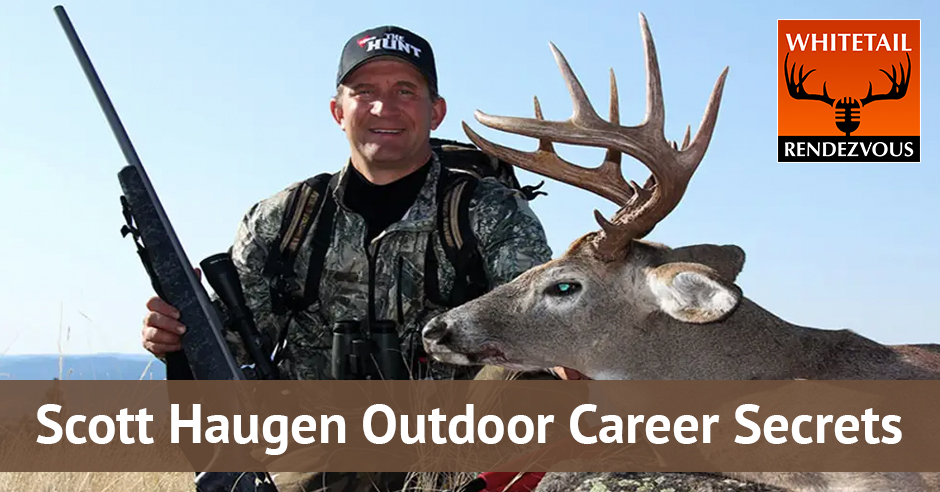
Without any doubt, knowledge is power and content is king, and you acquire both of them best outdoors. Scott Haugen of Haugen Enterprises answers the why of hunting in this ever-changing industry. For nearly twenty years, he has made a living through hunting and fishing, appeared on more than 450 TV shows, penned over 2,500 magazine articles, and written more than fifteen books. Needless to say, he is one of the living legends in the industry. As Scott breaks down what is special about hunting, find out the art of content creation and the business of the outdoors. On top of that, learn what it takes to be successful in the outdoor field and why it is essential to keep acquiring knowledge.
—
Listen to the podcast here:
Scott Haugen Outdoor Career Secrets
We get the technology out. We’re talking about the why of hunting in the changing industry and this is the extra special segment with Scott Haugen of Haugen Enterprises, and he’s up in the Pacific Northwest and did so many things, so many years. Scott, it’s just a pleasure to have you on the show. We’re reminiscing. We both hunted the same ranch in Wyoming several years ago. When you think about it, Scott, you said something that stuck with me. You got to build content and then you got to stick after it. Let’s illuminate that a little bit.
It’s interesting and like a lot of folks in the outdoor industry or back in the old days, I grew up hunting and fishing here in Oregon. My wife and I got married and moved to Alaska where we lived at pretty much a subsistence lifestyle up there in the Arctic for years. I was building the knowledge as we went and not knowing that I was going ever to be doing this for a career. I had the passion or the dream of one day writing a book, sharing all my tales. This is our eighteenth year now doing this full time. When we stepped away from teaching, my wife and I were both school teachers for several years, I figured out we’ll do this for a year or two so my wife could stay at home with the kids. We were starting our family. The more I got into it, the more I found that I’m apprehensive of if I’m waiting around, if I’m waiting for things to happen, if I’m waiting to be invited on fishing trips around the world and it’s going to be a long wait.
I just jumped in with both feet and cost is always an issue or a concern, but the more found that I just jumped in and went for it, the rewards were higher and they still continue paying off. It’s funny because, you mentioned the hunt and we’ve shared together with Center the of Nation outfitters, I think you came in a week or two after I did, and I just wrote another article about them. I think the first time I went with them was several years ago. We have the content and build the knowledge from these outdoor experiences wherever it may be and have good photos and have good notes and keep practically everything. It keeps paying for itself over and over again.
The folks at Center of the Nation are Guy and Shanna Howell. He’s a roper, semi-professional, but their girls have just unbelievably excelled in athletics as young ladies. If you ever get a chance, Center of the Nation, it’s up. It’s right on the Montana, South Dakota border, right Wyoming. I’m trying to think where the cutoff is to go up to their place.
We always just would go to Rapid City. We drove there once or twice, but we’re flying Rapid City. You can stand right on their property line and have one foot in North Dakota, one in South Dakota. One is in Wyoming, one in South Dakota and one in Montana right there on their property line.
At the mom’s original homestead. You say that the mom’s original homestead, the house has been there that many years. It’s just great when all of a sudden, you’re back in time. What’s been farmed and ranched and everything for all those years and then have those conversations. How did your family get started here? That’s part of hunting. I say it over and over again, but with the world we live in, people have to understand, especially the people in the common ground, not the left, not the right, but the common ground say, “What’s so special about hunting?” Come jump in my truck, spend a week with me and you’re going to meet some of the marvelous people in the world that you would never meet. Here are stories that even mediators’ book about the American buffalo. These people live right where the American buffalo live and part of their story, the buffalo jumps and stuff aren’t far away from their house. You start throwing all that and it’s like this is an open classroom. This is the outdoors, but it’s the history of our nation.
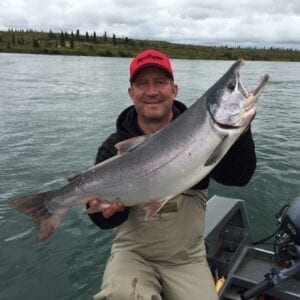 It is the people that you meet. I remember I was on a plane one time and we just got done filming a deer hunt in Montana and we’re flying into Portland, Oregon. We’re descending, as the plane was coming down to land in Portland, going down to Columbia origin. It was right at sunset and Mt. Hood was right there all covered in snow. Still, I can just close my eyes and see that beautiful sunset. This was several years ago and I was sitting next to a lady who was many years older than I and was. She said, “Are you from Oregon?” The first conversation we had on the whole flight, I said, “Born and raised.” She said, “How many times have you been to Mt. Hood?” I had a guilty a look. I said, “None, actually.” I said, “Have you hiked it?” She said, “I’ve been to the summit three times.”
It is the people that you meet. I remember I was on a plane one time and we just got done filming a deer hunt in Montana and we’re flying into Portland, Oregon. We’re descending, as the plane was coming down to land in Portland, going down to Columbia origin. It was right at sunset and Mt. Hood was right there all covered in snow. Still, I can just close my eyes and see that beautiful sunset. This was several years ago and I was sitting next to a lady who was many years older than I and was. She said, “Are you from Oregon?” The first conversation we had on the whole flight, I said, “Born and raised.” She said, “How many times have you been to Mt. Hood?” I had a guilty a look. I said, “None, actually.” I said, “Have you hiked it?” She said, “I’ve been to the summit three times.”
She said, “You’re a native Oregonian and you’ve never been to the top of Mt. Hood? Why not?” I said, “It’s because there’s nothing to kill when I get to the top.” I just said it not even thinking, but the look on her face obviously she wasn’t a hunter, but it got me thinking it’s what you said. It’s not about the kill. It’s about the journey that gets you there. I have hunting to thank for taking me all around the world, seeing the famine in Africa and the 120-degree weather in the swamps of Australia, several other countries and several states. It’s the journey that gets you there and it’s the people that you meet along the way. It’s the hardships that you endure that teach you about life and teach you about yourself. It’s not so much about the kill, especially the older I get.
The killing part is the eating part. It’s the harvesting. It’s the start of the next part of the hunt. We go out, we get our quarry, we kill it, we dress it, and we bring it back. We take care of it and process it, then we start eating it. How many meals have you had, your families had and you get recipes? I know you guys do well with the recipes and then you sharing these recipes and a meal with people and they go, “This is really good. What is it?” “It’s water buffalo from Australia or it’s sheep from Alaska or king salmon poached or whatever,” and the say, “This is really good.” “I secured it. I didn’t go to the grocery store. I harvested that. I’m a hunter and I’m a gatherer,” and that’s what we do. All of a sudden people say, “This is the end result of it all that that you do? I get the journey I cashed in so many times along the way, it’s scary,” which we really do.
My wife Tiffany Haugen writes cookbooks. She has over a dozen cookbooks out, Cooking Big Game, the whole thing. The only time she’ll buy any meat for the family to eat is if the company wants her to develop a recipe. She does a lot with Calgary Cooking Company, so they might want a rack of ribs or some steak or something like that. It’s funny because the boys grew up, they’re teenagers now, they’re sixteen and eighteen, and they grew up eating while gaming. They’ll eat a hamburger once in a while, but they don’t like steaks, top sirloins, fries. They just don’t like the fatty taste and texture of beef and they’re used to that lean, wild game.
In hunting, it’s not about the kill, but the journey that gets you there. Share on XTiffany kept track one time and two teenage boys, they eat a lot. I think there was one year, I think we ate three elk, a couple of antelope, two or three bears and then all the birds and fish and crabs and shellfish on top of that. That was pretty much the norm of our life. That’s one of the reasons we live. We’re born and raised here in the Northwest. We’ve probably got over 30 countries and I don’t know how many states and could live pretty much anywhere we went to, but right here in the northwest where we are in Western Oregon. You can hunt or fish year-round every single day of the year. It really comes down to what you said, put food on the table. That’s really why we do it.
With that, this bonus segment of why we hunt with Scott Haugen is going to end. Thanks Scott. We’ll move on.
—
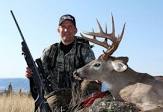
Scott Haugen and Tiffany Haugen, they’ve been in business quite a few years and they’ve got a lot of experience. People are paying for the experience now because they want to know how to do things. It’s the content that is selling. We’ve had numerous discussions already about what’s important in the outdoor industry now. Scott, that’s where we’re going to start off with what’s important for people looking at the industry. You’re an icon in the industry. Everybody knows who you are in the industry and you’ve been successful doing it your way and being a diversified businessman. Let’s talk about the business of the outdoors and then we’ll get into why we hunt and you’re hunting experiences.
Business-wise, I’m not a very good businessman, but I just stuck to my morals and integrity I never sold out, never compromise things for the sake of being famous. My goal and all that we’ve ever done was to teach and educate people and motivate them to get out there. Before we got into this industry full-time several years ago, my wife and I were school teachers up in Alaska. I come from a line of pre-school teachers. My wife comes from a line of school teachers. We actually met in second grade, my wife and I did. We knew each other the whole time. I went to the University of Oregon and she went to Oregon State. We went our separate ways.
We met right at graduation. We both had our teaching degrees. She said, “What are you doing with your teaching degree?” I said, “I’m moving to remote Alaska up in the Arctic because I want to teach up there and learn how to hunt and fish in those harsh conditions with Iñupiat Eskimos.” She said, “You better go now because no woman’s ever going to marry you and go up there.” Four months later we were engaged. Nine months later, we were married and we were teaching school up in Alaska together. We celebrated our wedding anniversary. It’s worked out good and it’s been a fun ride. We weren’t envisioning to be here. When we stepped away from teaching, I’ve been doing some writing for different magazines, but I might be able to make a three-year or two. We’d already had one son.
We moved back home to Oregon here and we want to have another child. I figured if I could do this for a couple of years at home, hunt and fish a little bit, and then I’ll go back to teaching and carry on a normal life. The timing that this was taking place was prime for the outdoor industry. Little did I know, but magazines were on high demand for quality content. Like a lot of folks, I’ve hunted and fished my whole life. We’re just coming off of Alaska where we lived a few years up in the Arctic, had a subsistence lifestyle up there. I could kill four sheep a year, a moose every year, a grizzly every year, five caribou a day, year-round. That was for subsistence purposes up there. Fishing or rent a couple of hundred miles wolf trap line up there with some great native Iñupiat Eskimo folks up there and just had a wonderful time.
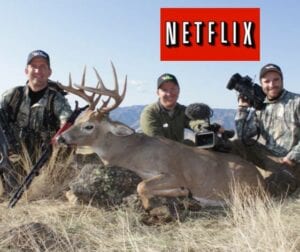 I also travel around the world and hunt and fish in a lot of places. Throughout my whole life, I was in the knowledge of the background that allowed us to be in a position where we could convey these things. My wife, she cooked everything that we got up there in Alaska. We butchered it ourselves. We packaged it, cooked it. Same thing when we moved back home. That didn’t stop. We were just fortunate that I have access to the more great fishing game because now we’re making a full-time living hosting TV shows, writing and speaking all in the outdoor industry. All the pieces of the puzzle came together at a nice time.
I also travel around the world and hunt and fish in a lot of places. Throughout my whole life, I was in the knowledge of the background that allowed us to be in a position where we could convey these things. My wife, she cooked everything that we got up there in Alaska. We butchered it ourselves. We packaged it, cooked it. Same thing when we moved back home. That didn’t stop. We were just fortunate that I have access to the more great fishing game because now we’re making a full-time living hosting TV shows, writing and speaking all in the outdoor industry. All the pieces of the puzzle came together at a nice time.
When you say that you spend a lot of time investing in your craft, you went back to college as a teacher, you went to college, paid some for some credits, but then you really got into your career, your advocation and invested in that. Let’s talk about that a little bit because some people don’t understand what it takes. That investment, what it takes to be successful, not just having a name up on social media, but be successful as a person knowledgeable and known and sort out in the outdoor industry.
I think being dedicated to acquiring the knowledge, that’s the biggest thing. Our biggest teachers through learning, I’ve been spending time in the outdoors. That’s something we couldn’t do if we had a regular full-time job. I know there are a lot of folks, I get asked every single day, “How do I break into the outdoor industry? How do I do what you have done?” Number one, you’ve got to quit your job because there’s no way you can acquire knowledge if you’re not out there in the field 250, 260 days a year, I don’t feel. Number two, you’re going to sacrifice a lot of family time. Even though you’re not working, you’re going to be working twice as long for you as you would for someone else, but you’re doing something you want to do. There’s got to be an understanding and support from the family. There were days when we were hosting a few different TV shows and going on 50, 60 events a year. I’m gone 280 days a year, sometimes 300 days because your hunting season starts the 1st of August, it’ll end mid-January and then you’re going right into to sports shows.
There was one year I was gone fifteen weeks in a row on sports shows probably around the country. My wife was with me on a lot of those. We would take the kids with us as well. The kids grew up in that atmosphere. There would be times when would have fled to different parts of the country and sometimes the kids that come with us. We homeschool them quite a bit when they were young. That was convenient. Having a dedication to acquiring knowledge through personal experience, not through reading. I hardly ever read magazine articles or books anymore. We don’t have a TV. I kept track one year a couple of years ago, I watched eight hours of TV and the other was three hours of the year after that. I just don’t have time.
Be very careful with who you align with because some only care about what you can do for them in the moment. Share on XI was always too busy out in the field creating my own content, living in my own little world and learning as much as I can through personal experience. Not through other people, through other writers, not through other books. I used to enjoy that growing up, but I’ve found that as I got into this and really wanting to make a living out of it, I didn’t want to acquire my knowledge through other people. I want to acquire it by being out in the field. Maybe it’s through other people that I’m with while I’m out in the field, biologists or guides or fellow hunters, things like that. The reason has been able to keep our boat floating longer than we planned, I think it comes back to genuine, pure knowledge. That knowledge holds value and that’s what we have in the passion of sharing with others.
The truism, knowledge is power is as true as anything. You have stage presence, obviously, because you’re so passionate about your knowledge. You were teachers, so you know how to transfer that knowledge off the whiteboard, off the slides, off your notes into a compelling story that people have takeaways. That’s the biggest thing. I get credit for Whitetail Rendezvous on every story. There’s a takeaway. People go, “I didn’t think of that.” With 500-some odd people, I’ve got a few years of experience just in that content. There’s no question about that. Saying that, that’s a great segue to here you are now, your downstream, been married 28 years and you’re still going strong. What is the one thing that you wish you knew now, the one big thing that you knew several years ago?
Someone asked me that. I’ve worked it out and the answer, my wife said, “You can’t say that.” I said, “It’s the truth, isn’t it? She said, “It’s really mean.” I said, “So is the truth.” We’re Christian folks and we don’t like to bash people, but the biggest disappointment I’ve run into is how quickly relationships deteriorate, not only this industry but I think just business all around. Years ago, a lot of the personal contracts, TV contracts we had, they were on a handshake. A handshake and a person’s word meant something. We’re owed so much money by people and by companies that those companies then change hands or they sell off.
When that happens and people owe you quite a bit of money and you have that happening with three or four companies, they just don’t care. They don’t care about you. They don’t care about the relationship. It’s all about what you can do for them at the moment and to help them excel. That’s one of the reasons we’re very careful with who we align with. We don’t do a lot of fame-seeking. We don’t do a lot of sponsorship shopping. We never approach a company to be sponsored by them. If they approach us, that’s fine, but we don’t seek that out. We’ve seen too many train crashes and I think that that’s been the most disheartening thing.
No matter how many times we tried to hook up with someone, try to help them out, try to get a business going and we come back, do the same thing and say, my wife and I, “Never again.” I would know. I’ve said this before. Never again are we trying to partner with anyone else because it’s always a train wreck. We’ve found that it’s better to rush just to stay small, keep it a family business, and maintain our integrity and just convey knowledge and the companies that want that knowledge will seek us out. We’re doing more short video content for people now.
It’s great because our boys are helping film that and they edit it. They’re able to get a pretty good income from that as well. We just changed with the times. Not to say that there aren’t great people out there. There are a lot of good people out there. I’m just surprised at the number of people who I’m really taken advantage of over the years. That was something I didn’t think you’d see in the outdoor industry. Few people hunt. About 7% of the population hunt, so you’d think that we’re on the same team here and if you tell me something, hold to your word at least so you can sleep at night.
Unfortunately, there’s plenty of stories out there and let them lay. I liked what you said. Create the content, build it and they will come and that’s what you’ve done with your business and kept your business with the moral compass, with the integrity, with the character that you set, not selling out saying, “If this happens, wow.” I don’t sense that wow factor with you. I sense a guy who’s really had a great life, got a wonderful family and got kids and then is living right in his sweet spot. It’s his own sandbox. That’s props to you that you can do that.
Technology is changing and allowing us to get our message out there to educate people and motivate them. Share on XI’ve been very blessed. We’re not going to be famous. We couldn’t really care less about that. Someday we’ll go back to the teaching probably. When that is and where that is, I don’t know. Things are always changing in the industry and that’s some of the challenges we like. I’ve been doing it for several years now and there’s no monotony at all. There’s always changing technology. When we went to digital from slide film, I have 60,000 slides in slipcases a little around my office and files. I have 250,000 digital images stored on this. That changed the world as well. I’m having a really good time now staying at home. The years we were on the road with the TV show, I was away from my dad quite a bit. My dad is 77 now.
We do a lot of hunting going out together now. We have a couple of dogs. I love the dog training, working with them, going on more bird hunts with my dad as he ages. Spending some time together there and stay a little closer to home. We’ve branched out, we’re doing some live stream stuff and content creation now for the Oregon Department Official Wildlife. It’s a very good educational platform and finding that live streams are a great way to reach that 80% of the population that doesn’t hunt or fish but having the interest in that possibly. It’s been fun seeing how technology is changing and allowing us to get our message out there to educate people and motivate them in different ways than we ever dreamed possible several years ago.
Let’s talk about your last season. People start in August and then in January and just high grade it and tell people how busy you were and what you were hunting and what you learned.
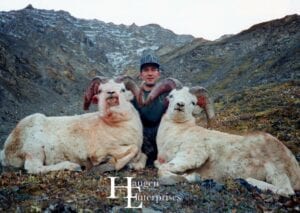 When we’re doing a couple of TV shows, you’re going on a lot of hunts. Archery hunts, rifle hunts. The west is still my favorite, the Western US. We were in Canada. We’re five times a year usually in Alaska, Africa, Australia, New Zealand. Go into a lot of different places, hunting, doing some fishing stuff here and there. Since we stepped away from TV years ago, our show The Hunt, we were done filming it, but then Netflix picked it up and they ran that for about a year-and-a-half. That contract ended. There was a lot that we’re hoping that they were going to pick up season three of The Hunt. We’re in season one and two. That was the intent. They were pressured pretty hard by the non-hunting community. The anti-hunters pressured them pretty hard because it was a hunting show and they didn’t like all the gun issues going on. The fact that our show was about killing and that’s what it was. It was a hunting show that is made for the Sportsman Channel, not for Netflix. In hindsight, we’ve been able to shoot a show and create it for Netflix, I think it would’ve had a much bigger impact because we would’ve filmed for a totally different crowd.
When we’re doing a couple of TV shows, you’re going on a lot of hunts. Archery hunts, rifle hunts. The west is still my favorite, the Western US. We were in Canada. We’re five times a year usually in Alaska, Africa, Australia, New Zealand. Go into a lot of different places, hunting, doing some fishing stuff here and there. Since we stepped away from TV years ago, our show The Hunt, we were done filming it, but then Netflix picked it up and they ran that for about a year-and-a-half. That contract ended. There was a lot that we’re hoping that they were going to pick up season three of The Hunt. We’re in season one and two. That was the intent. They were pressured pretty hard by the non-hunting community. The anti-hunters pressured them pretty hard because it was a hunting show and they didn’t like all the gun issues going on. The fact that our show was about killing and that’s what it was. It was a hunting show that is made for the Sportsman Channel, not for Netflix. In hindsight, we’ve been able to shoot a show and create it for Netflix, I think it would’ve had a much bigger impact because we would’ve filmed for a totally different crowd.
The Sportsman Channel show when we did a few years of The Hunt, that was built for hunters. We could have built a really good show for non-hunters or for people who want to look to get into that. We’ll learn more about why we hunted. That was a bummer to see go away because I saw a lot of potentials there. At the same time, Outdoor TV has changed so much. I really have no ambition to get back into that whatsoever, unless it was on like a Netflix platform, Discovery Channel or something like that. We’ll see how it goes. That’s one of the things that’s allowed us to make a great living in this industry is to diversify. We have the writing in magazines, we have our books, we have our seminar presentations, and we have a few pro-staff relationships.
We have the live streaming that we’re doing. All these little pieces of the pie allow us to keep food on the table. It’s a year-round endeavor. I was just trout fishing earlier this week. Before that, we were bending waterfowl with Oregon Department Official Wildlife in Eastern Oregon. Right before that, I was fishing up in Alaska, King Salmon. We’ll be doing quite a bit of fishing around here, crabbing, clamming here the next month or so, then I’m back up to Alaska. I’m up to Alaska three more times, fishing and then waterfowl hunting up there. We have some big games stuff around here, but I’ll be doing quite a bit of waterfowl hunting around here this year with my dad again. There’s never a dull moment. There’s always something to do.
Scott, it’s just been a pleasure connecting and thanks for your time. I know you’ve invested some time in us and I look forward to watching you continue to evolve because the journey’s possibly half over, but with your forethought and your understanding of the industry, education is huge. That’s the only way we’re going to recruit non-hunters is educate them into what hunting is and what hunting isn’t. I think the industry is lagging way behind on that aspect because to bring out a continually new market, I understand the business model and bring out new products all the time and have had a portion of the people say, “I’ve got to have that new boat.” It’s like I used to play golf a lot. I used to have that new Taylor driver because that would give me five more yards or whatever.
In the end, it really doesn’t matter. You can kill any deer with your 30-30 in Wisconsin that your grandfather had handed out to you and handing out to your grandson, the same rifle, because you’re hunting similar farm lots, the same farm. The deer are there because you manage them well. The tradition of the hunt just lives through the equipment and then through the stories and all that. That’s the marvelous thing about hunting that I’m trying to give back to my grandchildren and the people that read this. It isn’t just about pulling the trigger. It’s fun and exciting and I give thanks for every big game animal I ever took. That’s just the beginning. That’s not the end of the hunt. That’s just the beginning of the hunt. With that, any final thoughts?
It’s been a great industry to be a part of, be involved with a lot of changes, being able to mold with those changes that’s allowed us to be successful. If people are looking to get out there, it’s a scary slope because there are so many changes that are taking place. It all comes back to sharing knowledge, having a passion for educating people and motivating them to get them out there. The bottom line is we need more hunters, more anglers out there and the best way to do that is to have experienced hunters and anglers share that information. I encourage folks to do that in that good wholesome, wholehearted way and see if we can share with the rest on any roll out there how great it really is to do what we do.
Thank you, Scott.
Important LInks:
About Scott Haugen
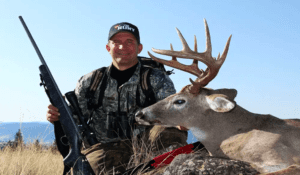 Prior to entering into the outdoor industry full-time in 2001, Scott Haugen taught science for 12 years. With a Masters Degree in education, a bachelors in science/biology, and over 40 years of hunting, fishing and trapping experience, Haugen is uniquely qualified to share what he knows and continues to learn. Since hanging up his teacher’s hat, he’s appeared on more than 450 television shows, penned over 2,500 magazine articles and written more than 15 books.
Prior to entering into the outdoor industry full-time in 2001, Scott Haugen taught science for 12 years. With a Masters Degree in education, a bachelors in science/biology, and over 40 years of hunting, fishing and trapping experience, Haugen is uniquely qualified to share what he knows and continues to learn. Since hanging up his teacher’s hat, he’s appeared on more than 450 television shows, penned over 2,500 magazine articles and written more than 15 books.
Haugen conducts over 60 seminars a year at sport shows, club events, retail stores, men’s groups and more. He also makes numerous guest appearances on radio and podcasts.
Scott’s show, The Hunt, which he hosted and produced, is the widest-reaching hunting-based TV show in network television history. The Hunt originally aired on the Sportsman Channel from 2013-2015 and is now airing on cable networks in over 45 countries, as well as on Amazon Prime. It ran for nearly 1 1/2 years on Netflix.
Scott also runs a small booking service, catering only to places he’s personally hunted and fished around the world. From Africa to Alaska, New Zealand to Australia, and more, Scott can help you arrange a personalized trip for a big game, birds and fish.
Having grown up in western Oregon, lived a semi-subsistence lifestyle in Alaska’s Arctic, and traveled to over 40 countries, today Scott spends more than 200 days a year in the field, hunting, fishing, scouting, working with his dogs, and photographing wildlife. Scott’s wife, Tiffany Haugen, is a nationally known wild game and fish cookbook author…together, they make a very unique team!
